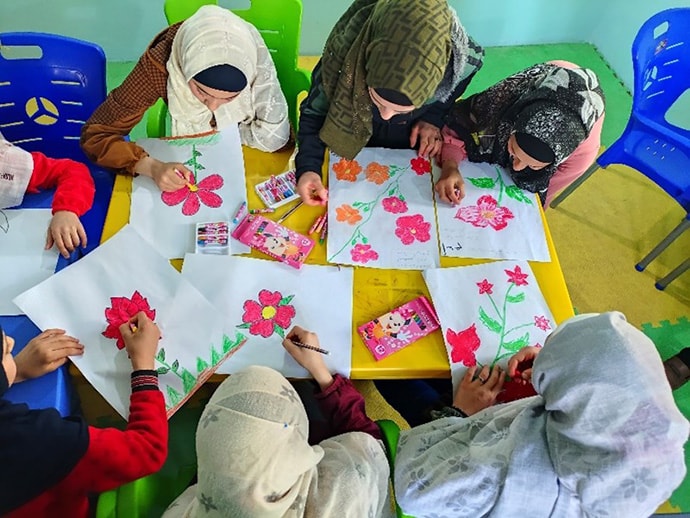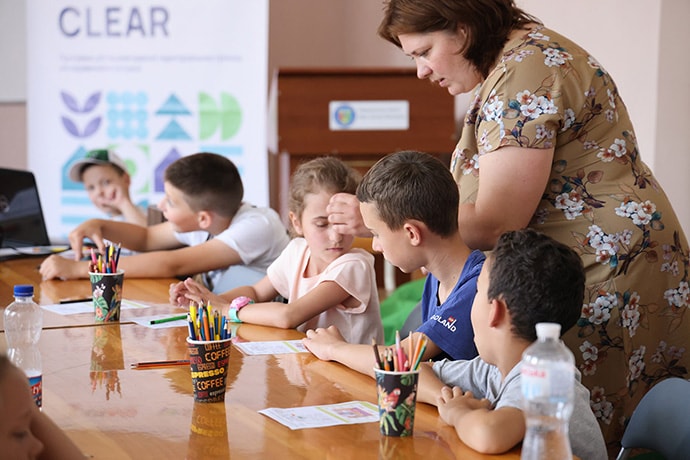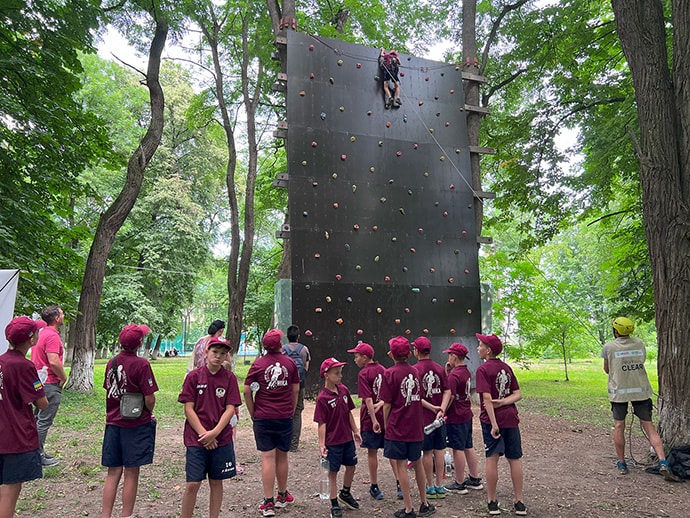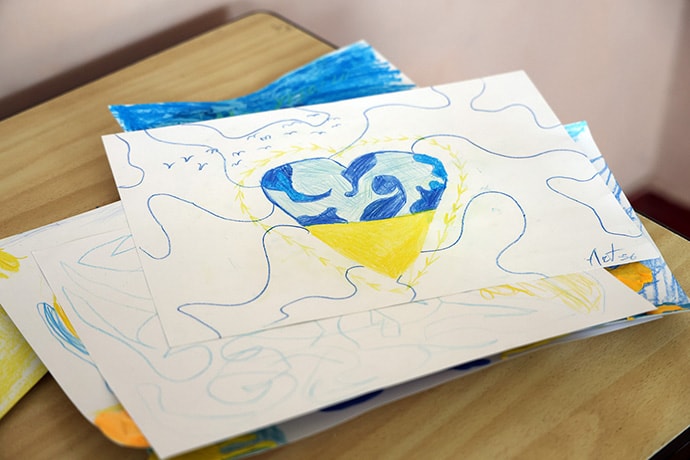By Emily Galloway, Tarek Fakhereddin, Nataliia Biloshytska and Tania Dudnyk, Global Communities

Children from the Atmeh Camp, Syria participate in art classes organized by Global Communities’ CiPE teams. Photo: Global Communities
Global Communities has a rich history of providing emergency aid and protection services to refugees and internally displaced people in many crisis settings, from Ukraine and Gaza to Syria and Guatemala. This includes our Child Protection in Emergencies (CPiE) programming, which supports the well-being of children and addresses risks created or exacerbated by crises. In emergencies, children are often the most vulnerable and at-risk population group. They face a range of threats, including violence, exploitation, family separation and a loss of education.
Global Communities employs community-based and multisectoral approaches to CPiE. We work to strengthen children’s resilience, prevent further harm and foster protective environments by engaging with children’s families and communities. We partner with caregivers, community leaders, local authorities, schools, nutrition specialists and health workers. Our CPiE interventions are usually implemented through Child-Friendly Spaces (CFS) and mobile teams trained to provide a variety of services to children. They encompass both prevention and response services, ranging from awareness raising and recreational activities to psychosocial counselling and case management. They are designed to meet children’s most immediate needs and support their long-term recovery. CFS allow children and caregivers to receive assistance in physically and emotionally safe environments. Mobile teams bring services to children and parents where they are: in their homes, schools, or healthcare facilities. This increases access and outreach to the most vulnerable.
Children enrolled in our CPiE programs also participate in life skills sessions and basic literacy and numeracy training, which helps them return to school when they are able to. Moreover, we facilitate parenting sessions which offer information about early childhood development, help caregivers manage their own stress, and provide parents with tools to help their children cope with the crisis. Our crisis response also includes cash assistance, for instance to ensure that children have stable housing, and other specialized services, for example removing children from harmful work.
“Global Communities implements large CPiE projects in Syria and Ukraine. These are very distinct contexts, requiring different approaches. In Syria, we have been providing direct services in displacement camps since 2016. We are the primary service provider in our communities because of the lack of local authorities and institutional services. Our Ukraine CPiE programming began in 2022 in response to the full-scale Russian invasion. Here, we employ a localization approach and provide services primarily through our local partners, typically community-based organizations (CBOs). The goal is to fill gaps in state services and strengthen the capacity of local actors to deliver humanitarian assistance.”
Caring for War-Affected Children in Ukraine
For over two years, Ukraine has been engulfed in a full-scale war, with devastating consequences for its children. As of March 2024, 600 children have been killed, 1,357 children have been injured and 3.2 million children need protection services.
The impact of the war on children cannot be overstated. Physical and psychological violence, displacement, loss of homes and loved ones, and restricted access to education and services prevail in their lives and negatively impact their well-being. Furthermore, since the war started, the risks of child exploitation, neglect, abuse, and gender-based violence have increased. Children affected by the armed conflict have lost not only their usual living conditions but also their social connections. They have been forced to part with their friends, classmates, teachers and sometimes family members. These changes have caused severe stress, anxiety, and trauma.

Children learn and play at the English language camp facilitated by the Khotyn Platform for the Development of Culture and Tourism – Global Communities’ local partner in the Chernivtsi oblast, Ukraine. Photo: Global Communities
Since 2022, Global Communities has been implementing the Community-Led Emergency Action and Response (CLEAR) program, financed by the Bureau for Humanitarian Assistance (BHA) of the United States Agency for International Development (USAID). Child protection is one of the key pillars of CLEAR. Most CiPE interventions are led by small organizations whose employees have experienced the consequences of war themselves. They apply the best practices of child protection in their communities with the program’s technical support grounded in global insights. These interventions include recreational activities, psychosocial services (such as art therapy classes) and life skills education for children, and psychosocial support for parents. Our partners not only help improve the psychological well-being of children and their parents, but they also support the integration of internally displaced people into host communities, which fosters social cohesion. Our program participants establish new social connections and make new friends, which helps reduce feelings of alienation. This is very important for children’s further development and well-being.
Healing through Art in the Sokyriany Community
One of CLEAR’s partner CBOs, Poshuk Innovatsi (Search for Innovations), works in Sokyriany—the most remote hromada (territorial community) of the Chernivtsi oblast (region). Global Communities is the only international organization providing humanitarian assistance to internally displaced people in this community.
Chernivtsi is located in the western part of Ukraine, which has been relatively unaffected by direct hostilities, but has received tens of thousands of displaced people fleeing the fighting in the east. Children who arrive at Chernivtsi from the occupied territories demonstrate signs of severe stress, anxiety and trauma. They are scared to be separated from their parents, do not want to leave their temporary homes and have problems with sleeping at night. Their parents are stressed, too. Busy addressing their families’ urgent needs, like housing and livelihoods, they often lack time to focus on their children’s emotional needs.

Children practice rock climbing organized by the Space for Community Development – Global Communities’ local partner in the Chernivtsi oblast, Ukraine. Photo: Global Communities
Poshuk Innovatsi began its CLEAR programming by meeting individually with displaced families to show them that they were not alone and to inform them about psychosocial support available to them through CLEAR. After that, the CBO involved staff of local schools to support the integration of displaced people. Then, they organized a series of creative lab classes for displaced and local children, where they could express their feelings through different activities, such as drawing, painting, and sculpting.
At first, displaced children used dark colors and drew tanks, explosions, and soldiers. During the clay therapy sessions, they ruined their own crafts, bursting with anger. Later, psychologists who facilitated these activities explained to the children how to express and process their feelings more flexibly. For example, the kids learned how to tear fabric and use it make Motanka dolls, which are traditional Ukrainian talismans representing prosperity, goodness, and hope. When displaced children showed signs of improvement, they started working in pairs with local children and making friends.

Drawing from English language camp, Ukriane. Photo: Global Communities
“Children are the most vulnerable category among internally displaced people. Often, they cannot express their worries with words, and we can see them only through their drawings, crafts, games, movements, and behavior. Our task was to help them cope with the emotions caused by the horrors of the war and the challenges in a new place of living. We wanted them to relax and start living full lives.”
Inna Yatsyshyna, Director of Poshuk Innovatsi
Poshuk Innovatsi’s social integration efforts culminated in a heartwarming family eco-picnic. There, children and their parents could relax in nature, connect with each other and participate in fun activities. Alongside new local friends, they planted trees, contributing to the emotional and physical well-being of their community.
Supporting Displaced Children and Caregivers in Syria
There are 5.5 million internally displaced people across Syria, including more than 2 million in camps and informal settlements. Idleb and Aleppo governorates in the northwest host the most displaced families, many of whom had to flee multiple times over the course of the 13-year conflict. The majority of displaced people living in camps have exhausted nearly all their economic, financial, physical, and social assets, and they are dependent on humanitarian aid, particularly for life-saving services such as water and food.
Protection of children remains a serious and widespread challenge in Syria. Specific issues include porous child protection referral mechanisms, weak case management, dysfunctional formal justice systems and a very limited access to specialized services, such as psychosocial support or care for survivors of gender-based violence. There is a dire need for comprehensive prevention and response interventions to reduce and mitigate risks to children caused by the conflict and displacement. Other needs include community sensitization and mobilization, and strengthening of local institutions, including traditional and religious bodies, so that they can provide better services to at-risk children.
Global Communities began protection programming in Syria in 2016, working both inside and outside of camp settings in northern Syria. To mitigate risks to children, we work through stationary CFSs and mobile outreach teams. We implement most extensive CiPE programming in the Atmeh Camp, which is located in the Idleb governorate and hosts an estimated 170,000 people. Our teams provide a wide range of services to children and caregivers, including awareness raising on child rights, play and learn activities, life skills, parenting skills, peer support groups, counselling, and referrals to essential services. We reach approximately 30,000 children and caregivers every year.
Promoting Girls’ Empowerment in the Atmeh Camp
Selin* is an 11-year-old girl who was born in the Atmeh Camp and – like most of her peers – has never had a home beyond the camp. Selin’s main caretaker is her mother; her father has been imprisoned for ten years. For a very long time, Selin lived in isolation. She used to avoid socializing with her peers, and she frequently showed signs of fear and confusion. When our team met Selin, they referred her to one of our social workers, who paid a home visit to her family.
The social worker observed that Selin had significant domestic responsibilities, despite being so young. She had to take care of her brothers, in addition to caring for her elderly grandmother. She was not allowed to leave the house, and she could rarely play with other children. She was also caught in a conflict between her mother’s and father’s families regarding her care. The social worker took time to explain to Selin’s mom how important play and learn activities are for children’s development. The mom noted that Selin loved drawing and was very talented, so the social worker suggested enrolling Selin in structured psychosocial support services, including art therapy. Eventually, our team registered Selin at one of our CFS centers and invited her mom to participate in parenting sessions. This changed Selin’s mother’s perspective on the importance of play and relationships with peers.
“These activities contributed to boosting Selin’s self-confidence, and she made new friends. Gradually, she began participating and playing with groups of children, overcoming the shyness and confusion that were initially apparent when she joined the center. Selin is now one of the outstanding children in the center, actively engaging in activities with other children.”
Tarek Fakhereddin, Senior Child Protection Officer, Global Communities
Through interventions like these, child protection efforts not only provide immediate relief but also lay the groundwork for long-term resilience and recovery. Ultimately, by ensuring the safety and security of children, these initiatives contribute to building more stable and sustainable communities in the aftermath of crises. Investing in children’s physical, emotional, and educational needs not only ensures their individual growth and development, but also helps to mitigate the same risks experienced by children in their communities in the future.
*The name has been changed to protect Selin’s identity.